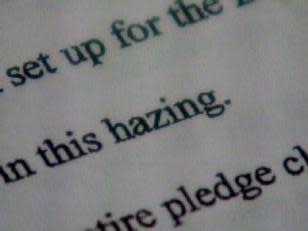 Trending Now
Trending NowY! Big Story: Hazing rites gone wrong
Everything you need to get up to speed on the big story of the day
Paddled. Forced to eat dog food or human vomit. Branded with a heated wire hanger. Thrown in a kiddie pool of human vomit, feces, semen, and rotten food. Deprived of sleep. Beaten until organ failure or death.
These aren't acts done to prisoners of war, but to pledges. Hazing is Gang Initiation 101, done in the name of athletic teams, church groups, fraternities, sororities, even bands. It's a test of courage that puts hair on your chest (when it's not being pulled out).
By its nature, recruiting by humiliation is secretive, more so these days as it's illegal in most states: Forty-four have anti-hazing laws. Often, a student suffered a mental breakdown or died to trigger legislation, and past the defense that hazing is a voluntary rite (and therefore a right)—a way to ferret out who's made of sterner stuff in a mollycoddled society.
Recent tragedies underscore that hazing (inevitably) continues. What might be changing are attitudes, as people shift from being cheerleaders and bystanders to advocates and guardians of those being hazed.
[Related: Soccer players accused of wrapping teammates in plastic as part of hazing stunt]
Death of a drum major:
Florida Agricultural & Mechanical University student Robert Champion belonged to the elite Marching 100, among the nation's best marching bands. He was gay, but his parents said his sexual orientation had long been known. What Champion did was to object to the band's practice of hazing, which once involved a beating so severe that a female freshman's thighbone was broken.
Champion suffered worse. On Nov. 19, in a charter bus parked outside an Orlando hotel, fellow band members allegedly beat and bloodied him so badly, his body went into hemorrhagic shock. The band director, who had reportedly warned university officials about hazing, retired May 10; 11 band members face felony hazing charges and two misdemeanors; the Marching 100 has been suspended for a year. Florida has one of the nation's toughest hazing laws, the Chad Meredith Act, named after the University of Miami pledge who drowned after binge drinking.
Other hazing examples
Florida University temporarily suspended Alpha Phi Alpha after nine were charged in a Jan. 22 hazing. No one had to be hospitalized.
Four Cornell University students go to trial May 21, nearly 15 months after the alcohol-poisoning death of George Desdune. College president David Skorton vowed "A Pledge to End Fraternity Hazing" in a NYT op-ed. (New York enacted an anti-hazing law in 1980, propelled in part by a student's death by bayonet.)
New York's Binghamton University ended all rushes in April, after receiving "an alarmingly high number of serious hazing complaints."
Boston University shut down Alpha Epsilon Pi and Sigma Delta Tau after several incidents, including one where police found five students duct-taped, beaten, nearly stripped, and covered with "condiment-type substances." (Massachusetts made hazing a misdemeanor after a Zeta Chi pledge died of alcohol poisoning in 1984.)
Members of little-sister sorority Omega Essence at Penn State allegedly beat four girls for hours, to remind them of their ties to slave ancestors. Two officials have since resigned. (Pennsylvania classified hazing as a third-degree misdemeanor in 1986.)
What's the big deal? A matter of degrees: If nobody is hurt and everybody is complicit, then what's the big deal? Most hazers want to "create allies ... not tombstones," as one anthropologist and hazing expert puts it.
One problem lies in the imbalance of power: On one side are the recruiters, who can fall into a mob mentality, even a "Heart of Darkness" ruthlessness. On the other are the susceptible, eager to belong at whatever cost. Factor in the youth of those just learning independence. While they make take pride in completing Herculean tasks, trivia questions and heavy boozing aren't quite the rites of a warrior culture many aspire to. And, as a cultural anthropologist pointed after a study found widespread hazing, a tribal elder usually presided over initiations into adulthood.
Adults have abdicated their role in the adolescent socialization process and turned the entire job over to the youthful peer group. Then we wonder why bullying, sexual abuses and even lethal hazing practices have emerged. (March 15, 2000, The New York Times)
Defiance in the face of changing attitudes:
After a series of damaging revelations at Dartmouth College in New Hampshire (home to StopHazing.org), a student wrote about the extreme inner life of a frat.
Good people can do awful things to one other for absolutely no reason. There is an intoxicating nihilism at the center of our culture that fraternities perpetuate through pathological lies while continuing the abuses. (Jan. 25, 2012, The Dartmouth)
His student-paper op-ed led to heated denials. Rolling Stone magazine followed up with even more eye-opening details, pointing out that sentimentality about hazing is disappearing.
Not so long ago, hazing was viewed at many universities as nothing but pranks, which deans might have privately deplored but nonetheless tolerated. Today ... many colleges have aggressively cracked down on fraternity abuses. Those that failed to do so have increasingly found themselves on the wrong side of the law. (March 28, 2012, Rolling Stone)
The revelations resulted in a three-semester probation for Sigma Alpha Epsilon. While critics say the punishment wasn't enough, experts agree about a larger attitudinal change.
"I've been following hazing for a couple of decades now," [Elizabeth] Allan, [co-author of the National Study of Student Hazing] said, "and I have seen waves—when there's a tragedy, there tends to be an outcry, and there's a flurry of attention around it, and then it seems to wane. Then it might happen again a few years later. This year, though, seems a little bit different." (May 10, 2012, Inside Higher Education)
Hazing is "extreme bullying": Some scholars link the backlash to a renewed focus on bullying.
"People are really recognizing, I think, that hazing is just an extreme form of bullying," [Rick] Barnes, [an author and speaker on Greek life and hazing] said. "By the time they get to college, I think, the thought pattern is, 'We've been having this discussion since seventh grade and we should be over this by now.'" (May 10, 2012, Inside Higher Education)
The story has been updated with the FAMU band suspension.





